Green chili substitutes are a simple way to tweak your recipes and make them brand new again, just by making them spicier or less spicy!
For those loyal fans of chili peppers like me, you will know that chili peppers can easily make or break a recipe. Most of the time, they turn a bland dish into a flavorful and appealing one. Green chili is no exception.
To find suitable substitute candidates, you need to rely on many factors, including the heat of the chili.
As many of you know, the spiciness of chili is measured and recorded through the Scoville Heat Unit (SHU), which is based on the amount of capsaicin. (1) The higher the SHU index, the hotter the chili pepper.
In this article, I will list many green chili alternatives with different SHU so that you can decide for yourself.
Moreover, I also mention their flavors and cooking uses which you might find helpful in your recipes.
Read on to discover more.
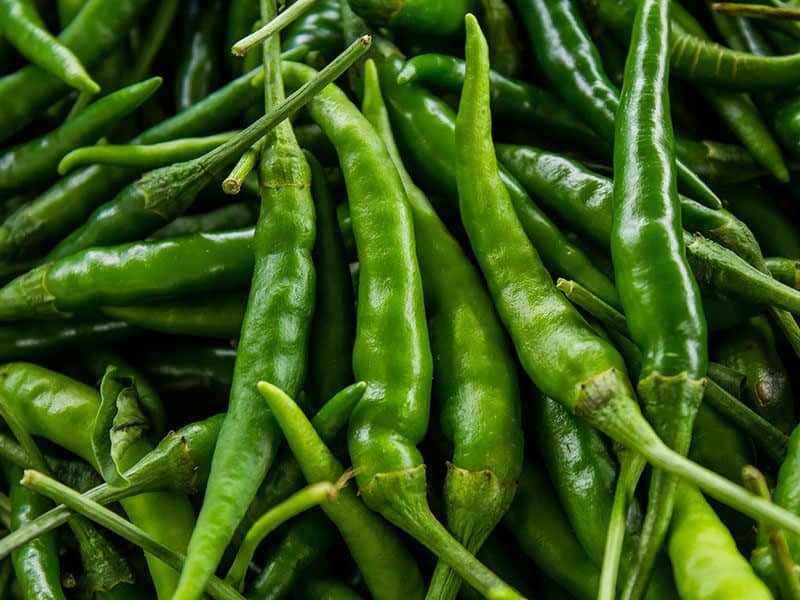
Table of Contents
What Is Green Chili?
Green chili peppers are widely used in cooking thanks to their ability to add flavor, heat, or sometimes color to your recipes.
When ripe, green chili turns to red color and then is usually used to make red chili powder.
You can easily find fresh green chilies in supermarkets and grocery stores. For some chilies which are not popular in fresh form, you can look for them in the canned food section.
However, people often prefer fresh chilies over canned ones because the former seems to give a more satisfactory kick of flavor than the latter. I totally agree with this.
Besides providing heat, green chilies are known for containing a high content of antioxidants and vitamin C, which your body needs.
Green chilies are medium-hot, which scores around 25000 – 100000 SHU, which is 4-5 times hotter than jalapenos.
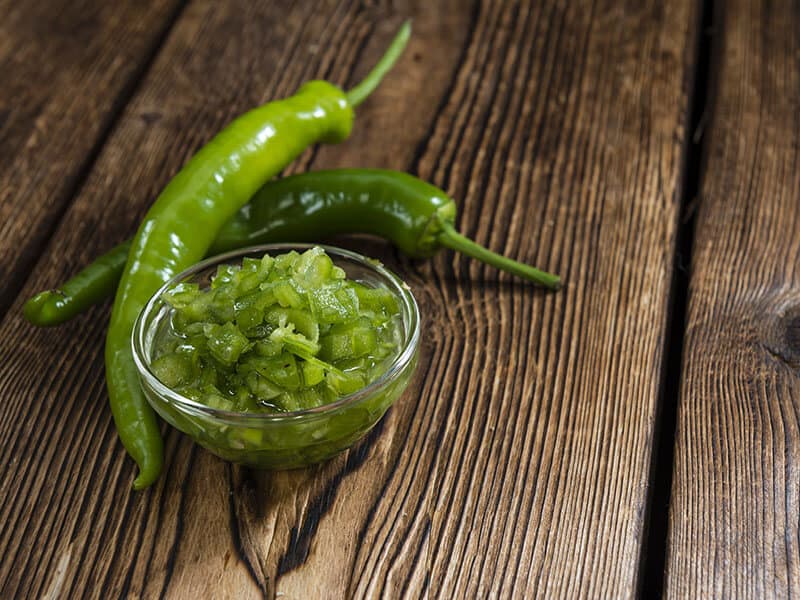
Comparison Chart Of Green Chili Substitute
Let’s take a quick look at every green chili substitute in the following table and find the one which is best suited for your preference.
15 Green Chili Alternatives To Elevate Your Recipes Greatly
Green chili substitutes are not hard to find. They are available in various shapes, sizes, and heat so that you can easily choose from them.
It’s up to your recipes that you can opt for banana pepper, chili powder, or fresh cayenne.
The following section will elaborate on each of them and give you a proper reason why you should go for this, not that.
Let’s start!
1. Banana Pepper
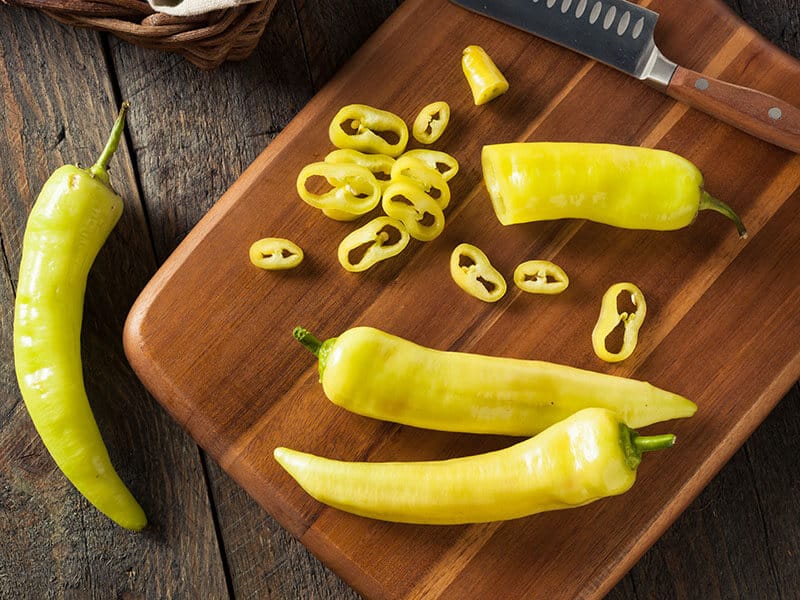
Banana pepper, known as banana chili, or yellow wax pepper, might be one of the best substitutes for green chili in your kitchen. People often eat banana pepper raw because it doesn’t produce as much heat as other types of pepper, only ranging from 0-500 SHU.
This pepper features a medium-sized and banana-like shape with pale green color when unripe. It also has a mild, sweet, and a bit tangy taste.
You can find banana peppers easily in grocery stores, supermarkets, or farmer markets. When you have many of them in the pantry, you can pickle them for later use. Pickled banana peppers can be tossed into your salad, pizzas, sandwiches, and surely brighten the whole dish.
Learn how to pickle a quick, crunchy, and easy jar of banana peppers.
2. Poblano Pepper
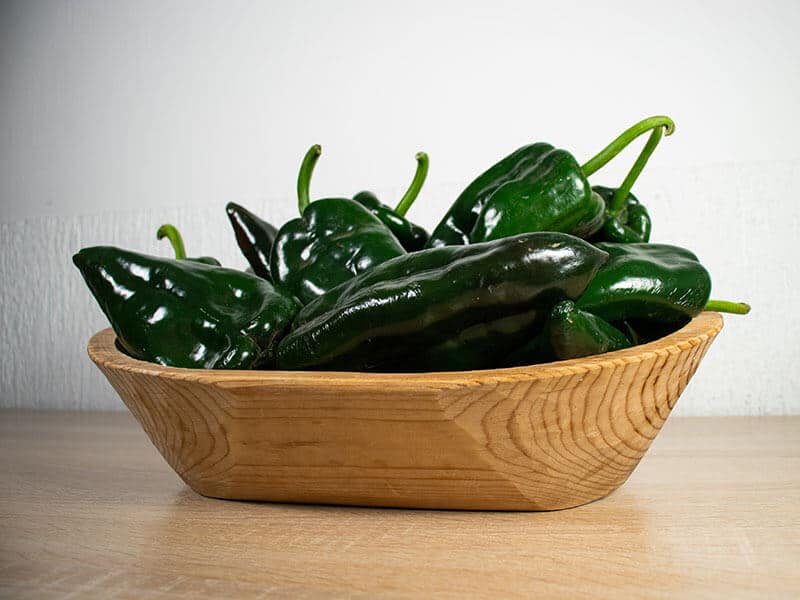
Have you ever tried chiles rellenos? This stuffed green chili pepper recipe is popular in Mexico and is made from poblano pepper. It’s also the next green chili substitute I suggest in my list.
The heat of poblano pepper ranges from 1,000-1,500 SHU so that it can add a mildly hot flavor to your dish. For people who might not know, it features a large size, even larger than a bell pepper.
Roasting and stuffing seem to be the most suitable cooking methods for this mildly spicy pepper, especially roasting, because it brings out the fruity, musky, and smoky savor of poblano pepper. Moreover, it also has a hint of sweetness.
3. Anaheim Pepper
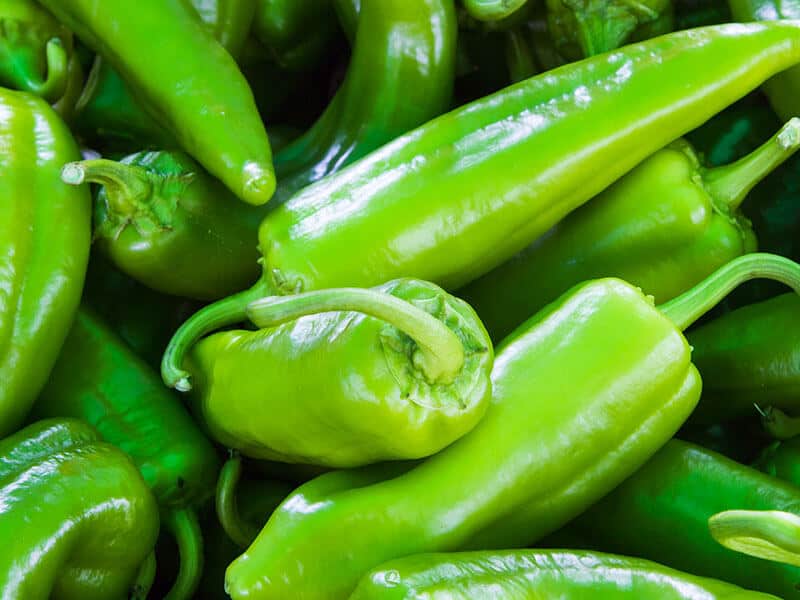
When eating raw, anaheim pepper has a bright, vegetal, and mild flavor, and when cooked, its aroma turns a bit tangy, smoky, and sweet.
It can add a pleasant crunch to your dishes with a medium heat that does not burn your tongue and linger on the palate. To be more specific, it scores 500-2,500 SHU. Keep in mind that its heat depends on where it’s grown.
Therefore, if you want to add an extra spicy flavor, but not too spicy, to the recipe in place of green chili, anaheim pepper is your wise choice.
It’s widely used in stuffing with various ingredients such as spices, vegetables, and cheese. It’s also perfect for stir-fries, roast dishes, and tacos.
Anaheim consists of potassium, vitamin C, vitamin K, vitamin A, and vitamin B6.
Poblano vs. Anaheim pepper – Are they the same? Here’s your answer!
4. Green Fresno Pepper
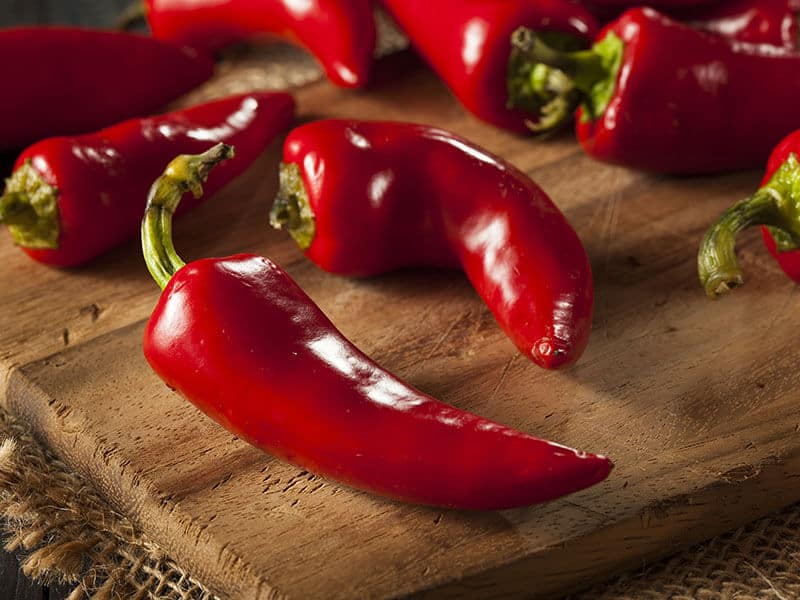
This glossy green Fresno pepper is one of the most popularly used peppers in the US. It owns a milder flavor when it’s young, but when it matures, it develops a smokier and fruitier taste.
Fresno pepper measures from 2,500 – 10,000 SHU, which is spicier than jalapenos; therefore, it’s best used as a green chili stand-in in relishes, salsa, chutneys, hot sauces, ceviche, and dips.
Many people like to enjoy it raw in sandwiches and burgers or make spicy pickles, while others tend to add it to stews, casseroles, and soups.
It has a crispy texture and looks much like jalapeno; keep in mind this, so you don’t buy the wrong ingredient for your recipe.
5. Serrano
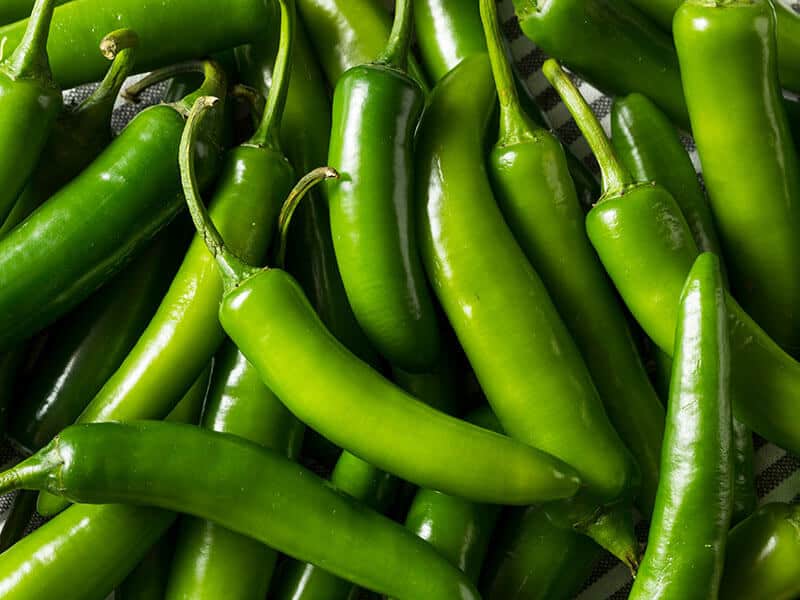
Serrano chili pepper can be available in red, yellow, brown, orange, and most commonly green. It is 2-5 times hotter than jalapeno and varies from 10,000- 23,000 SHU. You can use them as a substitute for green chili only when you want a seriously spicy dish.
Notably, you can guess the spiciness of the serrano based on its size; the smaller means, the spicier.
It features a fresh, bright, and biting flavor. Some might find it a bit earthy and grassy.
Serrano pepper performs well in various recipes such as hot sauces, salsas, relishes, and more. It can also be eaten raw and used as a garnish.
6. Thai Chili Pepper
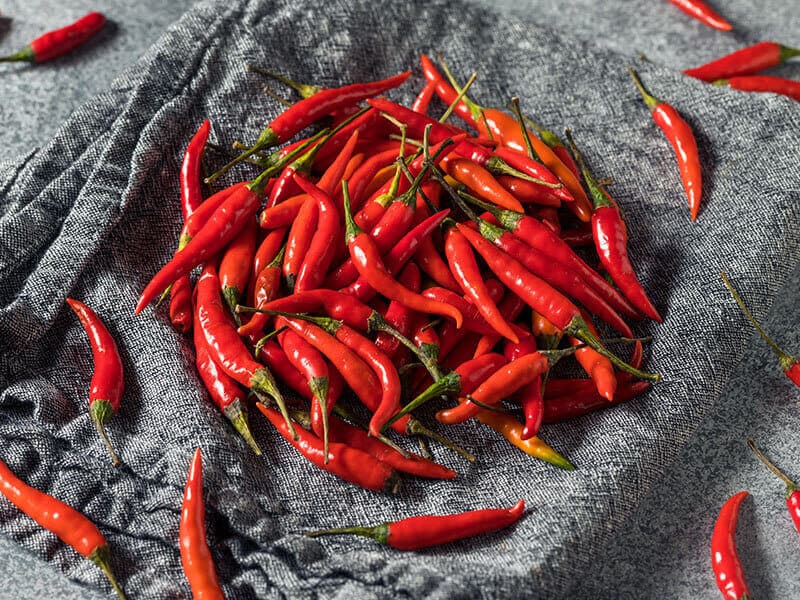
Thai chili pepper is 23 times hotter than jalapeno and only 3 times less spicy than a habanero. To illustrate, this tiny pepper has a score of 50,000 to 100,000 SHU.
It’s categorized as hot pepper, and you can try to use it in a place of green chili if you want to experience a spicy twist in flavor.
In Thai cuisine, Thai chili pepper is an essential ingredient of soups, curries, stir-fries, pasta, and noodles.
The flavor profile of Thai chiles is subtle, slightly fruity, and super spicy. One particular thing about Thai chili pepper is that you won’t feel the heat immediately, but your tongue starts tingling after a while.
7. Fresh Cayenne Pepper
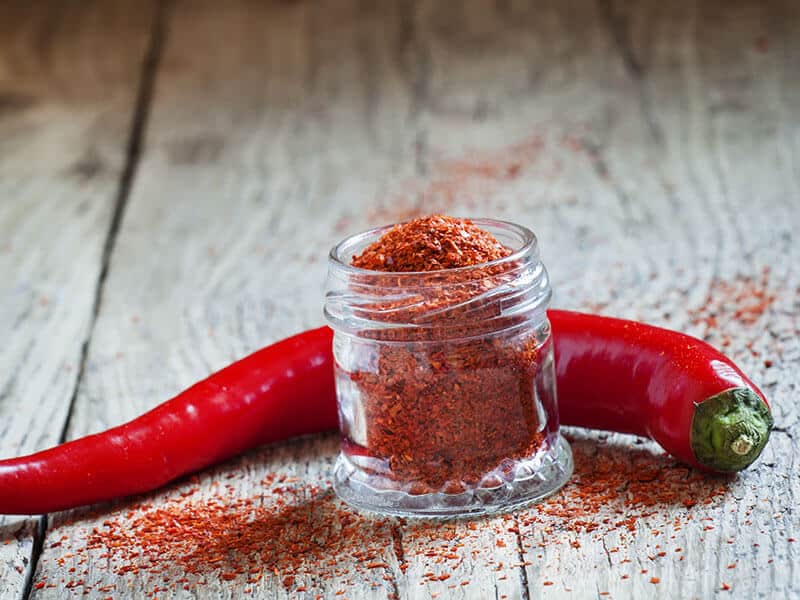
Cayenne pepper is considered a medium-hot chili that scores 30,000 to 50,000 SHU. It can replace green chili pepper and pairs well with meat, seafood, egg dishes, stews, and more.
Besides neutral and spicy flavor, it features an intense, earthy, and biting aroma which adds depth to whatever dish you put it in.
The secret to cooking with cayenne pepper is to start with a small amount and gradually add more until you get the expected flavor because cayenne can significantly intensify the dish’s aroma.
In terms of health, it’s an ideal source of manganese, vitamin C, vitamin B, vitamin K, and vitamin A.
What’s the health benefit of cayenne pepper? Let’s find out now!
8. Jwala Pepper
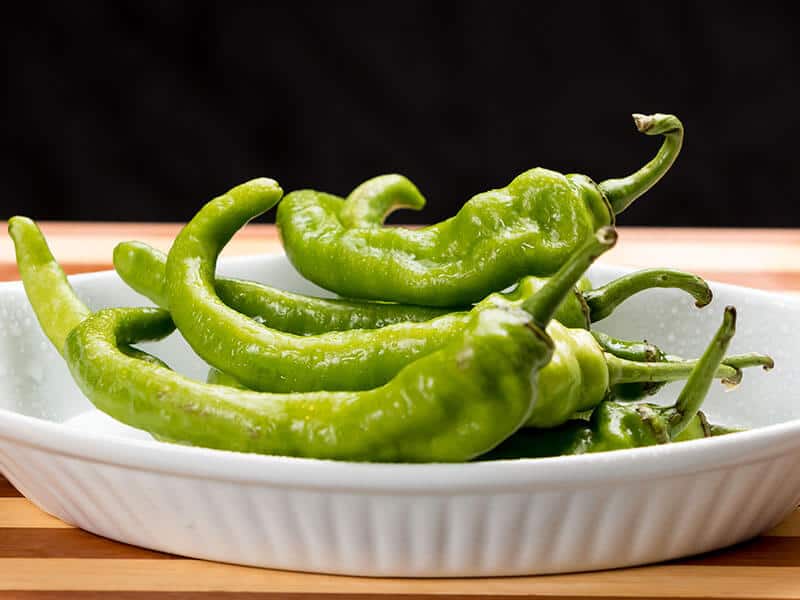
Jwala pepper or Indian finger hot chili is famous in Indian cuisine and is added to different salads or curries. Therefore, you can use jwala pepper as a green chili substitute in this case.
It can be dried quickly thanks to its thin walls, so you might find it in both fresh and dried versions in supermarkets and grocery stores.
On a Scoville scale, it comes in at between 20,000 to 30,000 SHU, so it can bring medium heat to your dish.
In terms of flavor, this 4-inch finger-like jwala pepper is said to have a fruity, nuanced flavor which is somewhat like an apple. It can act as a flavor-enhancer for fruity sauces and salty meats.
Make a paste of it, and you will have an ideal flavor enhancer which is even better than green chili.
9. Bird’s Eye Chili
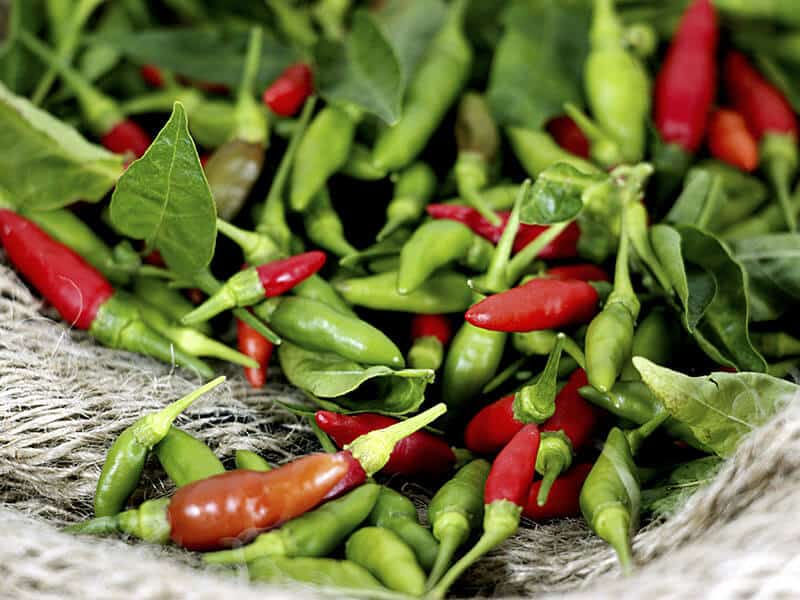
The bird’s eye chili is much smaller than other chili peppers in my list; it has a length of 2 inches and a width of only 1 inch with a tiny pointy shape, which looks like a bird’s eye.
You might know it with various names such as Malay name cili padi, bird eye chili, Thai chili, or bird’s chili. It’s also available in red, purple, yellow, or green colors.
For those who wonder, it comes with the SHU index ranging from 50,000 – 100,000 units; therefore, it’s a kind of hot pepper.
If compared to jalapeno, keep in mind that it delivers much more heat, about 10 times hotter, but it’s not too hot to burn your tongue. Moreover, it can impart a fruity flavor to the recipe.
When it comes to a green chili substitute, use it for stews, pastes, soups, sauces, salads, stir-fries, curries, and marinades. Because it can be hotter than green chili, pay attention to the amount when you add it to your food.
10. Jalapeno
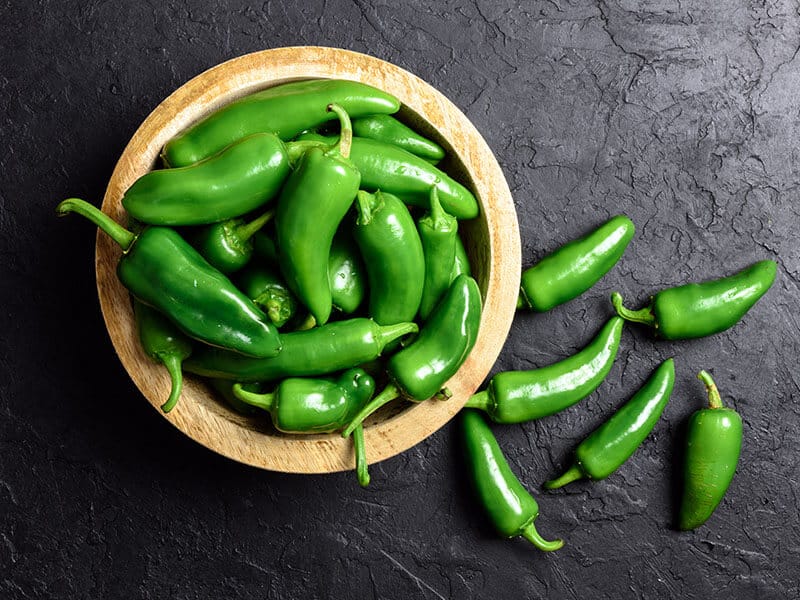
Jalapeno is a pantry staple in many kitchens and can be used in various recipes. For those who wonder, on the Scoville scale, its spiciness ranges from 2,500 to 8,000 SHU.
Its heat is considered kitchen-friendly, so it’s versatile and easy to work with. You can add it to dips, salads, stews, salsas, and more.
This green chili replacement is used as an ingredient to slightly enhance the peppery flavor in the recipe.
It’s said to have a bright, vegetal, sour flavor with an acidic aftertaste. When roasted, jalapeno develops an earthy and smoky aroma.
These oh-so-good jalapeno poppers should be made right now in your kitchen!
11. Habanero Pepper
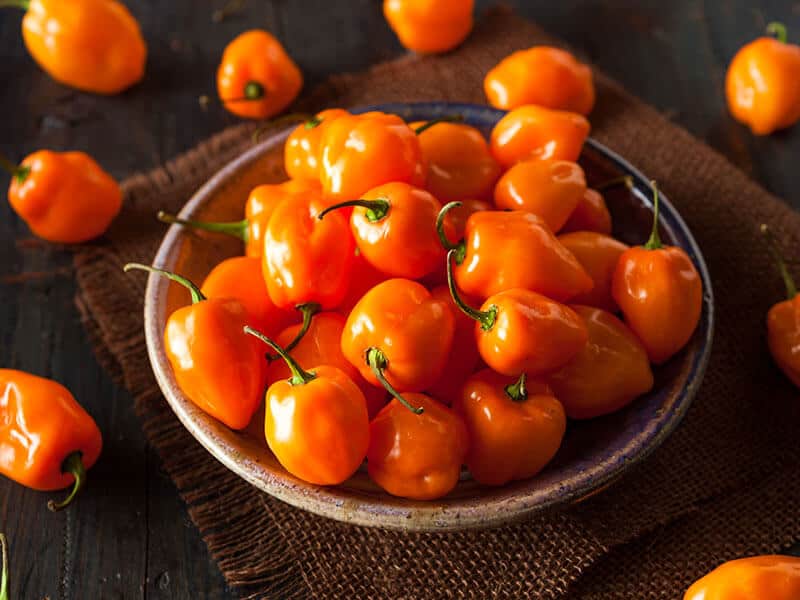
If you are a chili lover, there’s a high chance that habanero is available in your house. It belongs to the hot pepper category and has a score of 100,000–350,000 on the Scoville scale.
As you can see, it adds much more heat to the dish than green chili, so just a tiny amount of it will do the trick.
Habaneros feature a spicy yet floral aroma which is combined well with a slightly smoky flavor. You can eat them raw or add them to stewed, fermented, fried, or pickled dishes.
It’s said that these highly spicy peppers go well with sweet-tasting foods. Many people like to put it in their salsas, salad dressings, and sauces.
12. Chili Powder
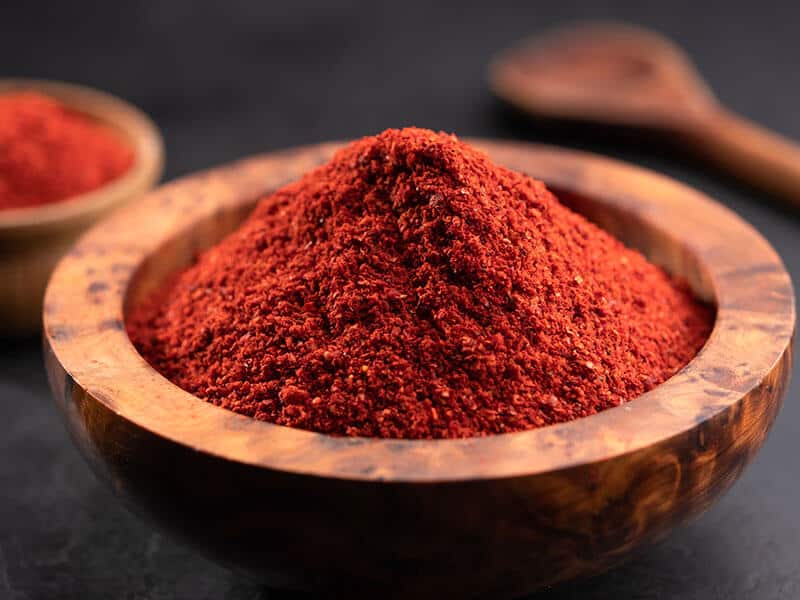
Chili powder is a well-mixed combination of both dried and ground chili peppers. It might be a mixture of 1 or various chili pepper varieties so that it can be an excellent replacement for any chili, including green chili. (2)
Moreover, it’s a shelf-stable condiment that you can always keep handy in your kitchen for months, even years. Sometimes, it’s blended with other spices to create a flavorful combination for various recipes.
These vibrant red powders come with different SHU indexes, depending on their components. It can range from mild to moderate spicy. Make sure you know how pungency you can tolerate before shopping for this product.
Many people like to make their own chili powder by mixing their chosen types of ground chili pepper and their favorite spices.
They can be an excellent addition to meat dishes, stews, grilled meats, burritos, seafood, meat rubs, meat and bean chilies, guacamole, taco, bean dishes, mole sauces, tamale fillings, and more.
As you might not know, hot sauce can be used much the same way as chili powder, especially in sauces and soups.
A couple of dashes of Tabasco or Sriracha can do the trick and successfully add heat to your dishes.
13. Red Pepper Flakes
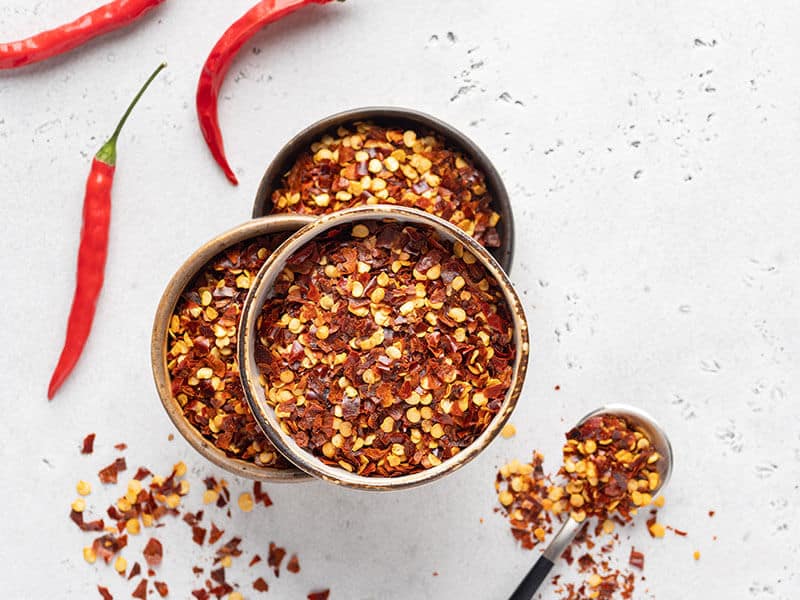
Red pepper flakes are a highly versatile pantry staple made from dried and crushed chili pepper. You can find red pepper flakes that contain mainly cayenne or different chili varieties such as anaheim, yellow or red chili peppers, and jalapenos.
Thanks to its dark red color, red pepper flakes add a beautiful hue to whatever you put it in, especially liquid-based recipes like curries, noodles, and ramen.
With the heat from 30,000 to 35,000 SHU, it imparts a mild heat and sharp flavor to eggs, chicken, beef, and lamb. It performs well in salad dressings, soups, pasta sauces, burgers, and tacos.
That is to say, it’s a convenient and brilliant way to replace green chili in various recipes.
14. Bell Pepper
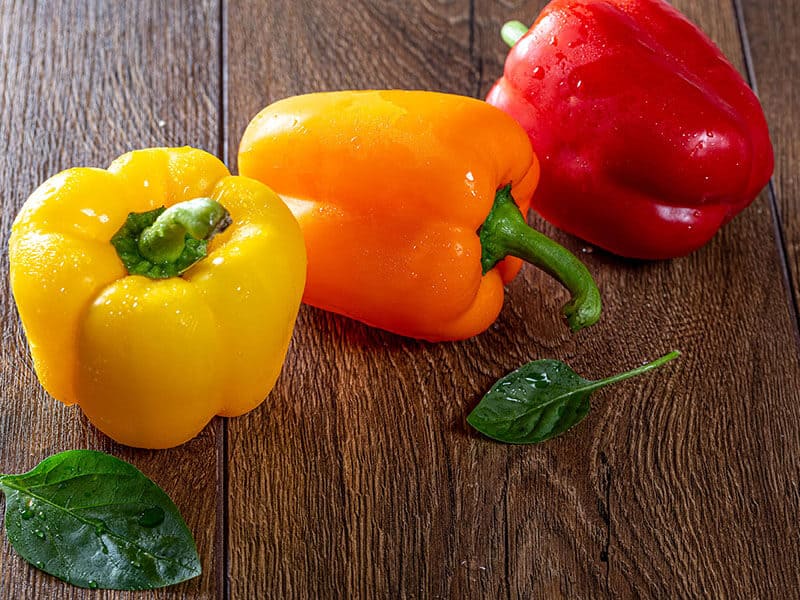
As you might already know, bell pepper has zero SHU. That means it isn’t spicy at all. Therefore, bell pepper can be an excellent substitute for green chili if you’re not a fan of super peppery dishes.
Bell pepper is a crunchy, sweet, grassy, and bright vegetable staple in your kitchen and can be found in rainbow colors, including red, yellow, white, lavender, green, dark purple, black, and brown.
Bell pepper comes with a high amount of water, beta-carotene, vitamin C, vitamin A, and other vitamins, so they’re great for your health.
It’s an essential ingredient of various recipes such as cornbread, pizzas, salads, cheesesteaks, and soups. Moreover, it tastes delicious in stir-fries, sautés, and grilled dishes. Notably, people often use it as a replacement for diced green chili in raw foods.
Follow me and find out the secret behind bell peppers’ different colors.
15. Pasilla Pepper
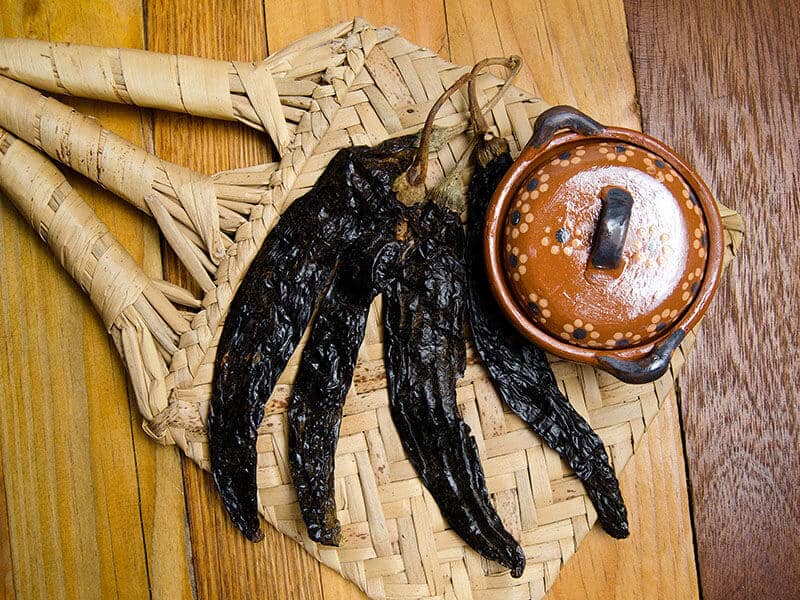
Pasilla pepper is known as a dried form of chilaca chili pepper with a SHU of 1,000 to 2,500. It’s considered a mild version of green chili substitute, which can bring a slightly pungent flavor to the recipe and is great for people with a low “spicy limit.”
In fresh form, it can change from dark green to dark brown according to its aging process. Many people perceive its taste as smoky and earthy.
This ingredient is highly prevalent in Mexican cuisine and is often used to make salsas, sauces (enchilada sauce and mole sauce), and table sauce. It’s said that pasilla pepper pairs well with honey, duck, meats, seafood, oregano, lamb, garlic, fennel, and mushrooms.
16. Ancho Chili Pepper
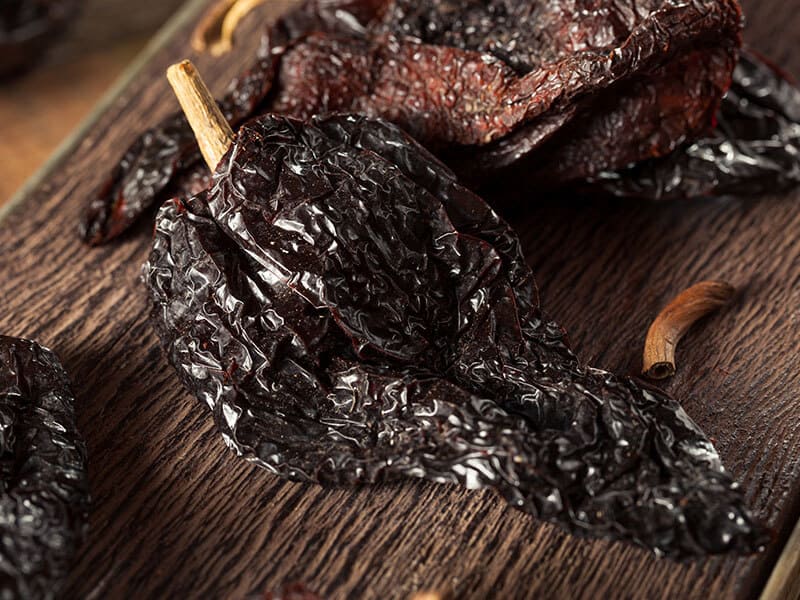
As you might not know, ancho chili pepper is the dried version of nearly mature poblano pepper. Therefore, it has a red wine color instead of a green one.
It’s another green chili alternative with a mild heat which you can add to sauces, soups, stews, salsa, or salads without worrying about making them too spicy. To be more specific, it scores 1,000 – 1,500 SHU.
Ancho chili pepper can impart a raisin-like, sweet, smoky, and chocolatey aroma to your dish and make it taste more flavorful.
Thanks to its complex savor, it’s a fantastic component of hot pepper jellies, chili pastes, and mild hot sauces.
FAQs
Here are some interesting questions about green chili and its substitutes. I hope you find them useful for your culinary journey with spicy things. Let’s explore!
Green Chili Substitutes Freshen Your Taste Buds
Most people like to add chili to their dish to make it more appealing. As you might know, each person has a “spicy limit,” and what’s yours?
Luckily, there are hundreds of chili peppers out there for you to challenge your taste buds.
Looking for green chili substitutes is a good chance for you to start a spicy journey and discover this limit.
Each type of chili will bring a different flavor and energy to the dish that makes you excited or skip a meal. Sounds fun?
I like staying in my comfort zone, so I tend to choose chili peppers that are moderately spicy and stick with them.
How about you? Tell me your experiences with green chilies and their substitutes in the comment section.
I look forward to hearing from you!
Reference
- En.wikipedia.org. 2021. Scoville scale – Wikipedia.
- En.wikipedia.org. 2021. Chili powder – Wikipedia.

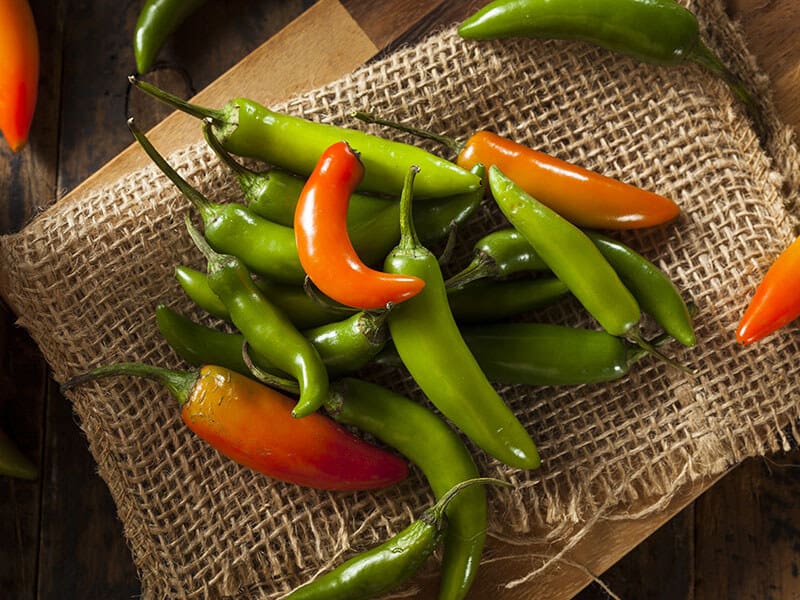

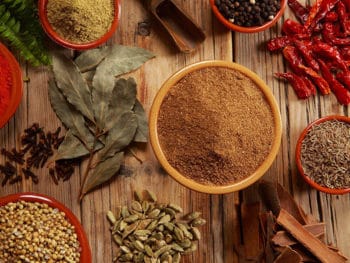
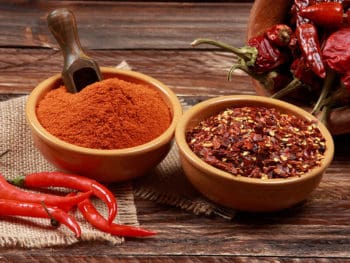
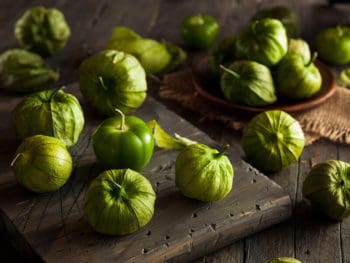
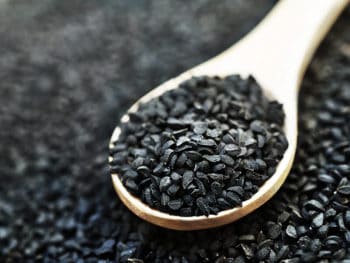

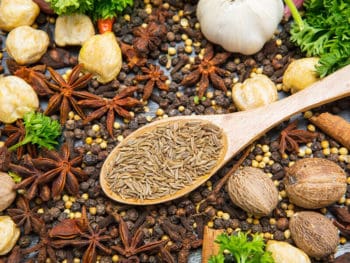

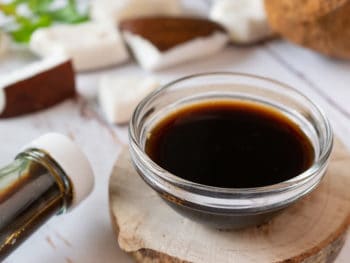
 Mustard Seed Substitute: 11 Best Ideas To Save Your Dish 2023
Mustard Seed Substitute: 11 Best Ideas To Save Your Dish 2023